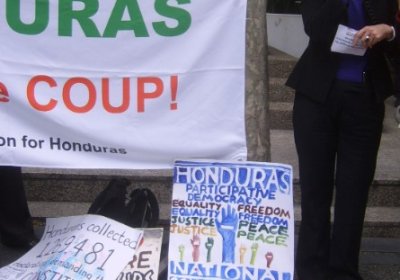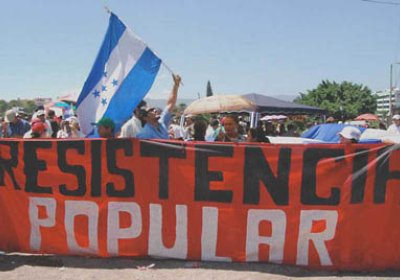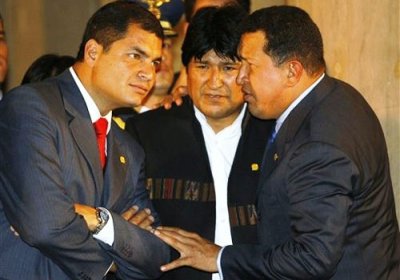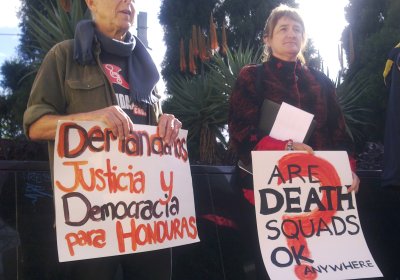The National Popular Resistance Front of Honduras (FNRP) received the annual International Herbert Anaya Human Rights Prize in El Salvador, awarded by human rights organisations. The FNRP struggles against the US-backed Honduran dictatorship that came to power in a military coup last year.
Gloria Anaya, the oldest daughter of the slain human rights activist for whom the award is named, told Prensa Latina the award ceremony took place during the closing of the Seventh International Congress on Human Rights at the University of El Salvador.
Honduras
Activists from campaign group Sydney Says No 2 Honduran Coup gathered on September 15 to mark Honduran Independence Day, 14 months after elected president Manuel Zelaya was kidnapped and flown out of the country in a military coup on June 28, 2009.
Although in exile, Zelaya continues to campaign against the coup regime. Inside Honduras, the National Popular Resistance Front (FNRP) campaigns against the illegitimate government of Porfirio Lobo.
Below is an abridged version of a speech given by Greens Senator-elect Lee Rhiannon at the Sydney action.
***
Thousands of people mobilised across Honduras on September 7 as part of the “civic strike” called by the National Popular Resistance Front (FNRP) to “demand that the neoliberal offensive against the poor be halted”.
The FNRP said rallies were held in the capital, Tegucigalpa and 10 other cities and towns.
As Colombia launched its new offensive against Venezuela, an emergency summit of Central American presidents on July 20 restored Honduras to “its rightful” status. That status was lost internationally when former president Manuel Zelaya was overthrown in a military coup in June 2009.
Using the pretext of the relaunch of the Central American Integration System (SICA), the presidents of Costa Rica, El Salvador, Guatemala and Panama agreed to reincorporate Honduras into the regional bloc and encouraged the Organisation of American States (OAS) to do the same.
BRISBANE — Quien Dijo Miedo (“We are not afraid”), an film about the popular resistance to the military coup that took place in June last year in the Central American country of Honduras, was shown at the Queensland Council of Unions building on August 6.
The screening was sponsored by organisations including the Communist Party of Australia, the Revolutionary Socialist Party, the Socialist Alliance, Guatemalan group URNG-MAIZ Australia, the Australia-Venezuela Solidarity Network, and the El Salvadoran FMLN.
On June 28 last year, democratically-elected Honduran President Manuel Zelaya was overthrown in a US-backed military coup.
Zelaya had upset US and Honduran corporate interests with policies such as blocking privatisation, increasing the minimum wage and joining the anti-imperialist Latin American bloc led by Venezuela and Cuba, the Bolivarian Alliance for the Americas (ALBA).
But it was Zelaya’s decision to grant a demand of the social movements and begin a democratic process towards rewriting Honduras’s pro-elite constitution that led directly to the coup.
The people of Honduras are continuing their struggle for democracy more than one year after the June 28 military coup that overthrew elected President Manuel Zelaya.
The dictatorship tried to legitimise itself with fraudulent elections that brought President Profiro Lobo Sosa to power. The United States government, which was complicit in the coup, recognised the results despite almost no other government doing so. The US has since fully restored military assistance.
The Bolivarian Alliance for the Peoples of Our America (ALBA) released a statement on June 28 reaffirming its commitment to the Honduran people’s struggle for a return to democracy one year after the coup that overthrew president Manuel Zelaya.
ALBA is an anti-imperialist alliance founded in 2004 by Cuba and Venezuela. Its members include Bolivia, Ecuador, Nicaragua, Dominica, Saint Vincent and the Grenadines, and Antigua and Barbuda.
Under Zelaya, Honduras joined ALBA, which suspended Honduras’s membership after the coup. The regime has since withdrawn from ALBA.
At dawn one year ago, on June 28, soldiers invaded the home of Honduran president Manuel Zelaya and flew him to Costa Rica.
It was a frightening throwback to the days when military men, backed by a local oligarchy and often the United States, could overturn the results of democratic elections.
It would also turn out to be a pivotal moment for relations between the US and Latin America. A new generation of left-of-centre governments in Argentina, Bolivia, Brazil, Chile, Ecuador, Paraguay, Uruguay, and Venezuela were all hoping for a new relationship with Washington.
The United States has renewed military aid to Honduras with a donation of 25 heavy trucks valued at US$812,000, Spanish website infodefensa.com said. On June 18, US ambassador Hugo Llorens also announced Washington would give Honduras $75 million through USAID for various development projects and $20 million as part of the Merida Program to enhance “security”.
Human rights organisations have reported that, almost a year after the coup that ousted Honduran President Manuel Zelaya, repression by security forces had left the country “more dangerous than Colombia”.
An Inter-American Commission on Human Rights (IACHR) delegation confirmed that the murder, harassment and intimidation of opposition supporters, journalists and peasant and worker organisers had continued “with impunity” since the coup regime handed power to President Porfirio Lobo in January.
A military coup, backed by the United States, ousted a democratically elected government in Honduras on June 28, 2009. It has arrested, without trial, thousands of democracy activists.
More than 50 activists from the National Popular Resistance Front (FNRP) have been killed, and there are more than 100 other violent deaths related to the coup and curfews.
The lesbian, gay, bi-sexual, trangender and intersex (LGBTI) community is being particularly targeted.
- Previous page
- Page 7
- Next page









